
Recently, NPR, with the Robert Wood Johnson Foundation and Harvard School of Public Health, released a poll that found that one-quarter of Americans reported that they had experienced significant amounts of stress in the previous month. That level of stress is similar to levels found in earlier polls. But is this much stress making us sick? The poll found that 70% of people experiencing high levels of stress reported that they were sleeping less--not getting enough sleep can negatively affect health. Other research tells us even more about the possible health consequences of too much stress and our capacity to cope with it. One of the top three sources of stress in the NPR poll, for individuals reporting high levels of stress, was stress from work problems. We know that jobs that are very stressful, with too much to do, can contribute to health problems, but only when those demands or challenges are not offset by the resources and authority to make decisions about the work. In fact, jobs that are very challenging--and in which workers have the authority and resources they need--are good for our health. The bad jobs are those with heavy demands that you can’t address or that never end--or those jobs that have no challenge whatsoever, that involve repetitive or boring work, with no say over what work gets done when. Not surprisingly, in the NPR poll, people in lower-paid jobs, with annual incomes under $20,000, reported more stress from work problems than did those with incomes of $50,000 or more (64% of low-income individuals reported work stress, compared to 57% of higher income people).
Another factor in whether stress makes us sick is whether the stress is chronic or from a single event. Certain life events are very stressful, such as the death of a loved one or divorce; one-in-six people reported that the most stressful event in the previous year was the death of a loved one, and fewer than one-in-ten reported a life change or transition, such as divorce, was the most stressful event. However, ongoing stressful conditions, such as chronic health problems, being a single parent following divorce, or poverty, are more likely to 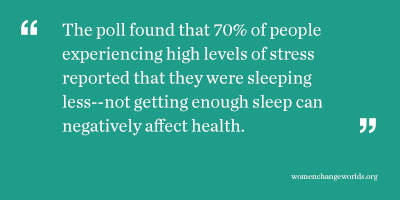 wear away at our health and wellbeing. The NPR poll found that individuals with a chronic illness were more likely to report high stress in the previous month (36% compared to 26% overall), as were individuals living in poverty (36%) and single parents (35%). These chronic stressors tax our abilities to cope with stress. For those individuals with high levels of stress, problems with finances was one of the main sources of stress, and this was especially true for those living in poverty (70% reported financial stress), those with disabilities (64%) or in poor health (69%), and for women (58%, compared to 45% for men). Chronic stress can lead to wear and tear or allostatic load, which can suppress immune function and lead to susceptibility to disease.
wear away at our health and wellbeing. The NPR poll found that individuals with a chronic illness were more likely to report high stress in the previous month (36% compared to 26% overall), as were individuals living in poverty (36%) and single parents (35%). These chronic stressors tax our abilities to cope with stress. For those individuals with high levels of stress, problems with finances was one of the main sources of stress, and this was especially true for those living in poverty (70% reported financial stress), those with disabilities (64%) or in poor health (69%), and for women (58%, compared to 45% for men). Chronic stress can lead to wear and tear or allostatic load, which can suppress immune function and lead to susceptibility to disease.
The other major contributor to stress, according to the poll, was having too many responsibilities overall. While this can mean different things to different people, it’s interesting to note that women were more likely than men to say that this was one of the reasons they were so stressed in the previous month. One life situation that can give us that overload feeling is combining employment with raising a family. While many men and women find that combination to be beneficial – would you give up your family or choose to stop working? – there are circumstances when the combination can be a negative. Women and men can experience strain from the stresses of too much to do at work and at home. However, because women tend to spend more time in family labor than do men, women with young children and not enough support or resources at work or at home are particularly at risk.
Poverty, bad jobs, too many responsibilities— these can all contribute to poorer health; these stressors are not randomly experienced by everyone, but rather fall more heavily on those with less advantage and opportunity in their lives. In a 2010 review of the latest research on stress and health, Peggy Thoits argued that the greater exposure of members of less-advantaged groups (women, race-ethnic minorities, lower-income and working class individuals) to chronic or high stress was one of the reasons that we find poorer health among women, race-ethnic minorities, lower-income and working class individuals. There are many possible responses to this reality, but central to that must be recognizing the health consequences of high levels of stress and addressing some of the underlying stressors, such as inequality and injustice.
Nancy Marshall, Ed.D. is an Associate Director and Senior Research Scientist at the Wellesley Centers for Women (WCW) at Wellesley College. She leads the Work, Families and Children Team at WCW and is an Adjunct Associate Professor at Wellesley College.




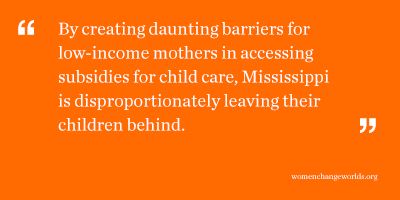 In Mississippi, advocacy for low-income women and children tends to occur only in the non-profit and non-governmental sectors, which are both relatively under-resourced in comparison with other states. No adequately powerful counter-voice exists to offset the public tone of hostility toward low-income women. Further, conscious and sub-conscious racism is so entrenched in Mississippi that even policies that would appear to address racial discrimination turn out to have no impact. Mississippi could be said to be “Ground Zero” for structural racism. So intractable is this form of racism at all class levels that the elimination of
In Mississippi, advocacy for low-income women and children tends to occur only in the non-profit and non-governmental sectors, which are both relatively under-resourced in comparison with other states. No adequately powerful counter-voice exists to offset the public tone of hostility toward low-income women. Further, conscious and sub-conscious racism is so entrenched in Mississippi that even policies that would appear to address racial discrimination turn out to have no impact. Mississippi could be said to be “Ground Zero” for structural racism. So intractable is this form of racism at all class levels that the elimination of 
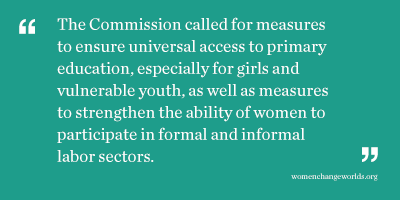 The Commission also stated that the post-2015 development agenda must include gender-specific targets across other development goals, strategies, and objectives -- especially those related to education, health, economic justice, and the environment. It also called on governments to address the discriminatory social norms and practices that foster gender inequality, including early and forced marriage and other forms of violence against women and girls, and to strengthen accountability mechanisms for women's human rights.
The Commission also stated that the post-2015 development agenda must include gender-specific targets across other development goals, strategies, and objectives -- especially those related to education, health, economic justice, and the environment. It also called on governments to address the discriminatory social norms and practices that foster gender inequality, including early and forced marriage and other forms of violence against women and girls, and to strengthen accountability mechanisms for women's human rights.
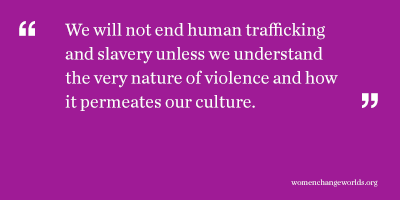 Utilizing such “rape myths” like the need for well-lit streets and women’s ability to walk safely perfectly illustrates Haugen’s limited understanding of sexual violence:
Utilizing such “rape myths” like the need for well-lit streets and women’s ability to walk safely perfectly illustrates Haugen’s limited understanding of sexual violence:  Social Justice Dialogue: Eradicating Poverty
Social Justice Dialogue: Eradicating Poverty
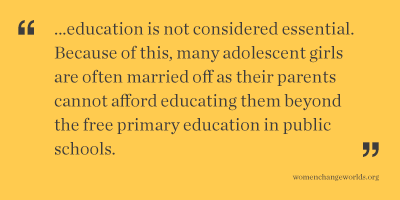 I was fortunate, however, that my parents were not desperate for the bride price when I was a growing up. I could have been sold for a cow or a goat. Instead, at age 14, when I was feeling hopeless and working as a barmaid, a wonderful family in Kentucky (who knew one of my cousins from when they had done missionary work years earlier) enabled my return to school by paying my school fees for five years. I went on to earn my college degree before working with organizations that were striving to improve the lives of poor families in Africa.
I was fortunate, however, that my parents were not desperate for the bride price when I was a growing up. I could have been sold for a cow or a goat. Instead, at age 14, when I was feeling hopeless and working as a barmaid, a wonderful family in Kentucky (who knew one of my cousins from when they had done missionary work years earlier) enabled my return to school by paying my school fees for five years. I went on to earn my college degree before working with organizations that were striving to improve the lives of poor families in Africa.
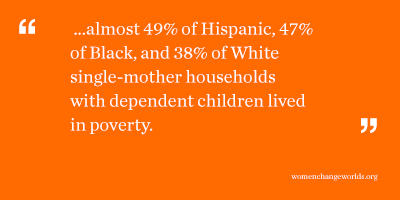 The inadequacy of full-time, year-round minimum wage earnings to support a family. In 2009, single mothers earning the hourly minimum wage of $7.25 earned just over $15,000--well below the poverty level of $17,285 for a family of three. These earnings are far below the median U.S. family income (almost $50,000) and the median earnings of dual earning households (over $78,000).
The inadequacy of full-time, year-round minimum wage earnings to support a family. In 2009, single mothers earning the hourly minimum wage of $7.25 earned just over $15,000--well below the poverty level of $17,285 for a family of three. These earnings are far below the median U.S. family income (almost $50,000) and the median earnings of dual earning households (over $78,000).